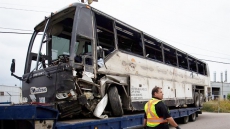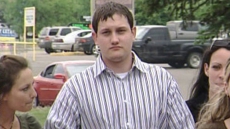EDMONTON - Powel Crosley was lost after his wife died of a rare form of ovarian cancer.
But he felt compelled to carry on her fight somehow against the disease and to help find a treatment for others — so he went back to school.
The 60-year-old, whose long grey hair is often pulled back in a ponytail, stands out as the oldest student in most of his classes at the University of Alberta, where he has been enrolled as an undergrad student since 2010. At times, he has been mistaken for a professor.
It wasn't easy for Crosley to sit in a classroom again. It had been decades since he studied geography in university and he'd already had a career in information technology. But he was determined to learn as much about cancer as possible. He took introductory courses in biochemistry and oncology. Then one of his profs asked him to do lab research alongside masters and doctoral students.
Recently, the science rookie was awarded $60,000 in grants to keep studying granulosa cell tumour of the ovary, otherwise known as GCT, which accounts for about five per cent of ovarian cancer cases.
Several photos of Crosley's wife, Sladjana, pop up on his computer screen in the lab, where he will spend the next two years working on the project. She was the one with the brains, he says, a chemical engineer with years of science and lab experience, who pored over scientific literature on GCT during the 13 years she battled the disease.
"Her motto was: the answer lies in the lab," says Crosley. "She was pretty persistent about things she believed in. And so I'm just basically completing her mission.
"I want to show that she was right."
Crosley, originally from Buffalo, N.Y., says he was working for a consulting firm in Oak Ridge, Tenn., when a stunning brunette walked in for a job interview. He learned that Sladjana Milenkovic had first moved to his home town from Serbia.
The two quickly bonded over their love of the Buffalo Bills football team. Then she floored Crosley with her intelligence and sketched some complex molecular diagrams on a white board. He hired her and couldn't bring himself to erase her drawings for weeks.
They had their first date a few months later. Crosley knew she loved opera and, although he had never been before, happily bought tickets to Verdi's "La Traviata." Opera became their thing and, after they married and Sladjana took his last name, the couple travelled to see performances around the world.
In 1996, Sladjana went to hospital with abdominal pain. Doctors attributed it to gas and sent her home. Later they found a mass on one of her ovaries. They removed it and informed her she had GCT.
"They said it's kind of a cancer, but not really. It almost never comes back and nobody ever dies of it, so we don't have anything to worry about," Crosley recalls.
"We thought everything was fine."
Three years later, after the couple had moved to New Zealand, the GCT returned. It did so again and again, even after several major surgeries.
Crosley says that during her illness, his wife couldn't find out much about the disease, so she established the Granulosa Cell Tumour Research Foundation and posted information on its website for others.
She also took part in various drug trials and, by making and selling jewelry, raised money to finance new research.
She died in 2009 at 58.
Crosley took over the foundation and began running marathons to keep fundraising going. He weighed options for schools so he could learn more about cancer and settled on Edmonton. He and his wife had visited the city before on business trips and liked it — even in the winter.
He also wanted to start over in a new place, one that didn't have so many memories.
Mary Hitt, an associate professor of oncology at the university, was impressed by the mature student in her class who asked so many questions. When he approached her to talk about his ideas, she invited him to work in her lab.
He faced a steep learning curve but has proven himself, Hitt says. And he's the only one there doing GCT research.
"It's been an inspiration to other people in the lab, too, because of his dedication. He's so motivated and really interested in what's going on and interested in new therapies and trying out new things."
Crosley's project involves testing a new drug developed at the University of Illinois for use against other cancers. So far, he says, its results against GCT have been encouraging.
And he thinks not having a science background may actually be a good thing.
"Sometimes you get the answer by going against the flow or thinking of things in a different way."




